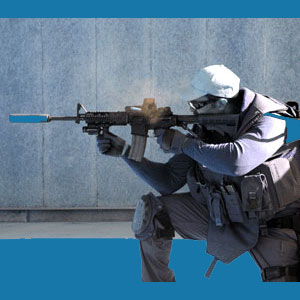
Tactical shooting is a valuable skill for virtually any private investigator to learn, but is absolutely necessary for certain types of related industry careers, such as bodyguards, armed guards and paramilitary contractors. The average detective does not carry a gun, nor do they have any job-related need to use a firearm. However for investigators who can carry a gun, it is crucial to fully understand the letter of the law governing firearms use in any area of the world where case work may take place.
It is also a good idea to have considerable marksmanship skill if you are carrying or using firearms to further any career path. This is why tactical and defensive shooting classes are always advised for some varieties of detectives.
This editorial details the use of deadly force for professional investigators and explains why some industry vocations require expert firearms skills as inherent parts of the job.
What is Tactical Shooting?
Many people have basic knowledge about shooting a gun. Some people like to hunt, while others simply like to take some occasional target practice at the firing range. While basic firearms operations, such as aiming and firing, are easy to learn, tactical marksmanship applications are far more involved and challenging.
Offensive and defensive tactical firearms instruction teaches students how to use guns against active human targets, who are likely to be returning fire. Tactical weapons utilization is an inherent part of police training, military training and bodyguard training.
The basic skills learned include safe weapons practices, how to shoot in a variety of conditions, how to shoot under pressure, how to fire without being shot yourself, how to utilize firearms in public settings, how to lay down suppressive fire, how to engage multiple targets and how to reload the weapon under a variety of challenging circumstances.
Advanced skills include sniper applications; use of high-powered and long-range weapons, marksmanship in extreme environments and how to manage teams of marksman in combat situations.
Tactical Firearms Instruction
Basic tactical firearms instruction may be available at your local firing range, but I recommend finding expert instruction to really build useable skills. Many investigation professionals already have a good base of gun knowledge, due to former military or law enforcement experience and can learn a tremendous amount in a short time, if exposed to a world-class instructor.
Many of the major firearms organizations offer continuing education classes in various types of shooting practices, including tactical applications. A number of specialized schools also offer the programs, usually in combination with other types of training, including survival, tactical driving, threat assessment, explosives ordinance handling and covert operations.
The best place to gain a complete education in tactical firearms handling is certainly in military Special Forces units, law enforcement SWAT teams and in paramilitary deployments.
Tactical Shooting Training
Learning new skills always creates new opportunities. As previously mentioned, most private eyes do not need to carry a gun, and in fact, a firearm may be a huge liability for some investigators, who must constantly surrender the weapon in order to enter government buildings.
Armed guards should have basic tactical marksmanship experience, in order to protect themselves and their clients, while bodyguards need a moderate to high level of tactical skill.
Paramilitary contractors need to be expert tactical shooters, since their lives are put in danger regularly. Of all the investigative niche careers possible, paramilitary contractors require the most tactical skills and must also understand that now, more than ever, the social and ethical implications of their actions and decisions will be judged as harshly as their actual skill sets.
A final word of advice for any investigative professional: Make sure to use these tactical firearms skills only in appropriate life or death circumstances in order to avoid paying severe criminal penalties for the unlawful use of your weapon.


